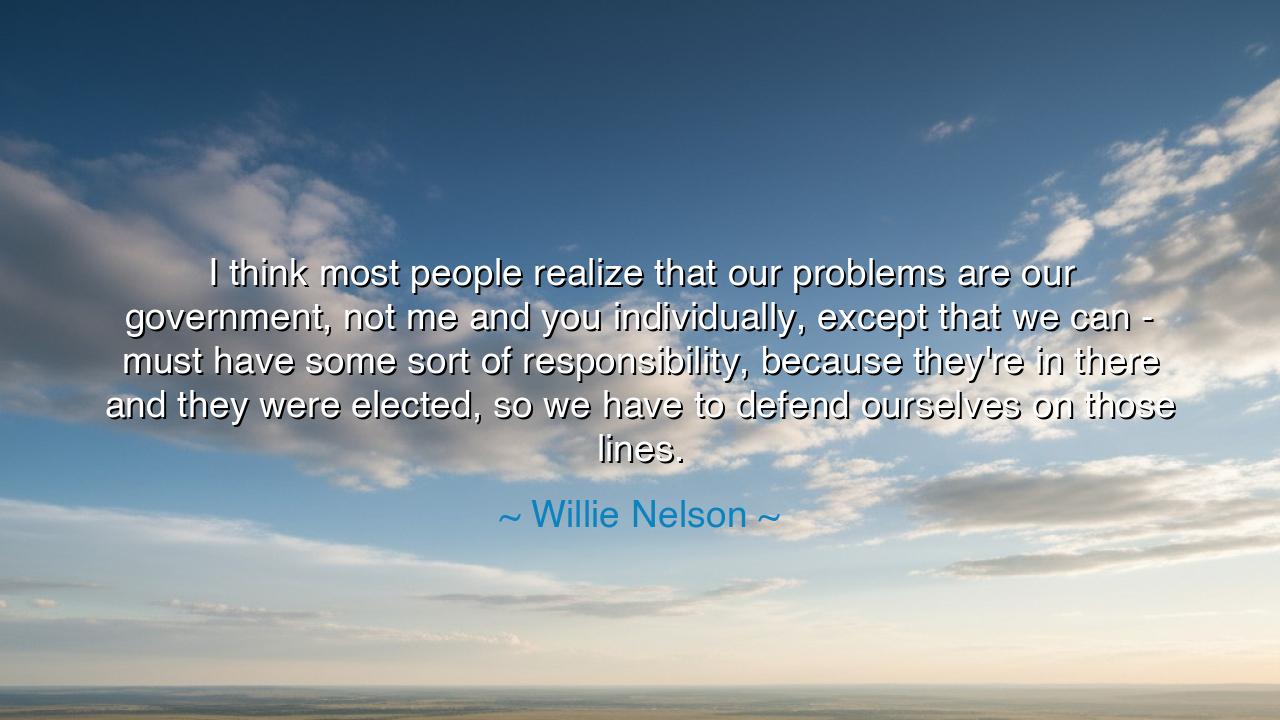
I think most people realize that our problems are our government
I think most people realize that our problems are our government, not me and you individually, except that we can - must have some sort of responsibility, because they're in there and they were elected, so we have to defend ourselves on those lines.






The words of Willie Nelson, the troubadour of the American spirit, carry the weight of both lament and wisdom: “I think most people realize that our problems are our government, not me and you individually, except that we can — must have some sort of responsibility, because they're in there and they were elected, so we have to defend ourselves on those lines.” In this reflection, Nelson does not speak as a politician or philosopher, but as a man who has lived long enough to see how nations lose their way when citizens forget that they themselves are part of the problem—and, therefore, part of the solution. His words are both an accusation and a plea: government may be flawed, but it is the mirror of the people who choose it.
At the heart of this quote lies the eternal tension between power and accountability. Nelson, known for his plainspoken truth, reminds us that the failures of government—its greed, corruption, and negligence—do not arise from some alien force outside of society. They are the collective consequence of apathy, complacency, and disconnection among the governed. When people complain of corruption yet abstain from civic duty, when they condemn dishonesty but reward it with silence, the government becomes the embodiment of that silence. Thus, Nelson’s insight burns with irony and realism: our leaders are not strangers—they are the reflection of the nation’s soul.
The origin of Nelson’s words can be traced to his lifelong engagement with social and political issues. A voice of both rebellion and compassion, he came of age in a turbulent America—an era marked by Vietnam, civil rights struggles, and the disillusionment of Watergate. He witnessed how ordinary people, weary of deceit and bureaucracy, began to distrust institutions altogether. Yet, rather than surrender to cynicism, Nelson urged self-awareness. His philosophy was not one of resignation but of shared responsibility. He understood that while the machinery of government may be corrupt, it was still fueled by the will—or the apathy—of the people. His words echo a principle as old as democracy itself: that freedom demands vigilance, and that the governed must remain the guardians of their own liberty.
History, too, affirms his truth. When the Roman Republic began to crumble, it was not merely because of Caesar’s ambition or the Senate’s greed, but because its citizens had grown indifferent. The Roman philosopher Cicero lamented that the people, once fierce defenders of their republic, had become spectators in their own governance. They allowed corruption to thrive, believing it was not their concern. So too in modern times, when citizens treat government as something distant and inevitable, they forfeit the power that rightfully belongs to them. Nelson’s words, then, are a call to awaken from that slumber—to remember that every law, every injustice, every policy of neglect survives only through the consent, silence, or forgetfulness of the people.
Yet Nelson’s message is not one of despair—it is one of empowerment. He reminds us that while the government may fail, the people’s will endures. “We must have some sort of responsibility,” he says, meaning that the first act of self-defense in a democracy is awareness. To “defend ourselves on those lines” is to take back what was surrendered—to speak, to vote, to question, to stand for what is right even when it is inconvenient. It is to resist the easy lie that nothing can be changed. For history shows that all great transformations—whether the fall of empires or the birth of new nations—begin when ordinary people reclaim responsibility for their destiny.
There is something profoundly moral in Nelson’s view. He does not call for rebellion in anger, but for reflection in humility. His words remind us that it is not enough to curse the darkness; one must light a candle. Each citizen, by living with honesty and courage, contributes to the renewal of the whole. Corruption cannot flourish where integrity takes root. Apathy cannot survive where conscience awakens. Thus, Nelson’s teaching aligns with that of sages across the ages: that the strength of a nation is not in its government buildings, but in the character of its people.
The lesson, therefore, is simple yet sacred: do not separate yourself from the state that bears your name. The government may err, but it is born from your collective will. To complain without acting is to feed the very system one despises. To despair is to give the corrupt their victory. Instead, take responsibility—vote with conviction, question authority with respect, and live by the principles you wish to see in power. True change begins not in the halls of Congress, but in the conscience of the citizen.
So let the words of Willie Nelson echo like a song across the generations: “Our problems are our government, but our government is us.” The day the people awaken to that truth is the day democracy breathes again. For a nation’s salvation does not lie in kings or congresses, but in the hands of those who have the courage to see themselves not as victims of power, but as its rightful stewards.






AAdministratorAdministrator
Welcome, honored guests. Please leave a comment, we will respond soon